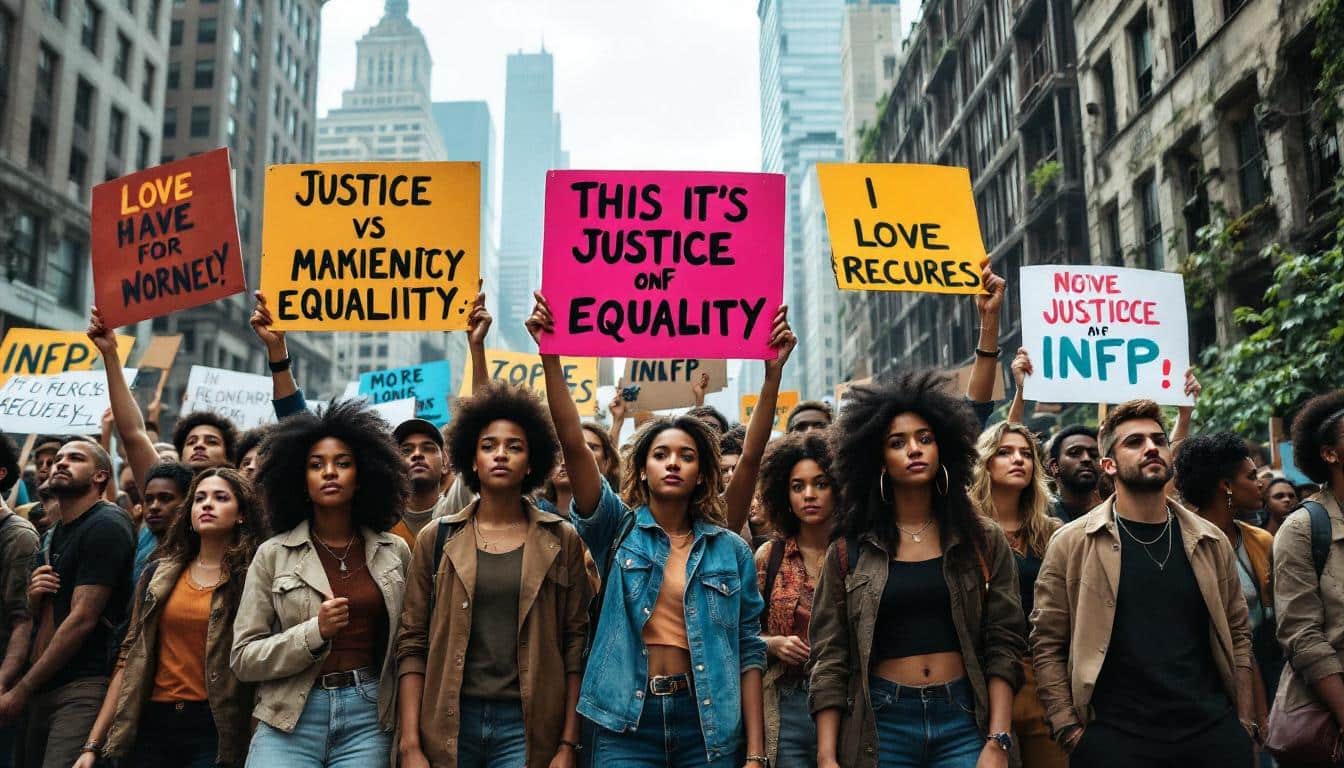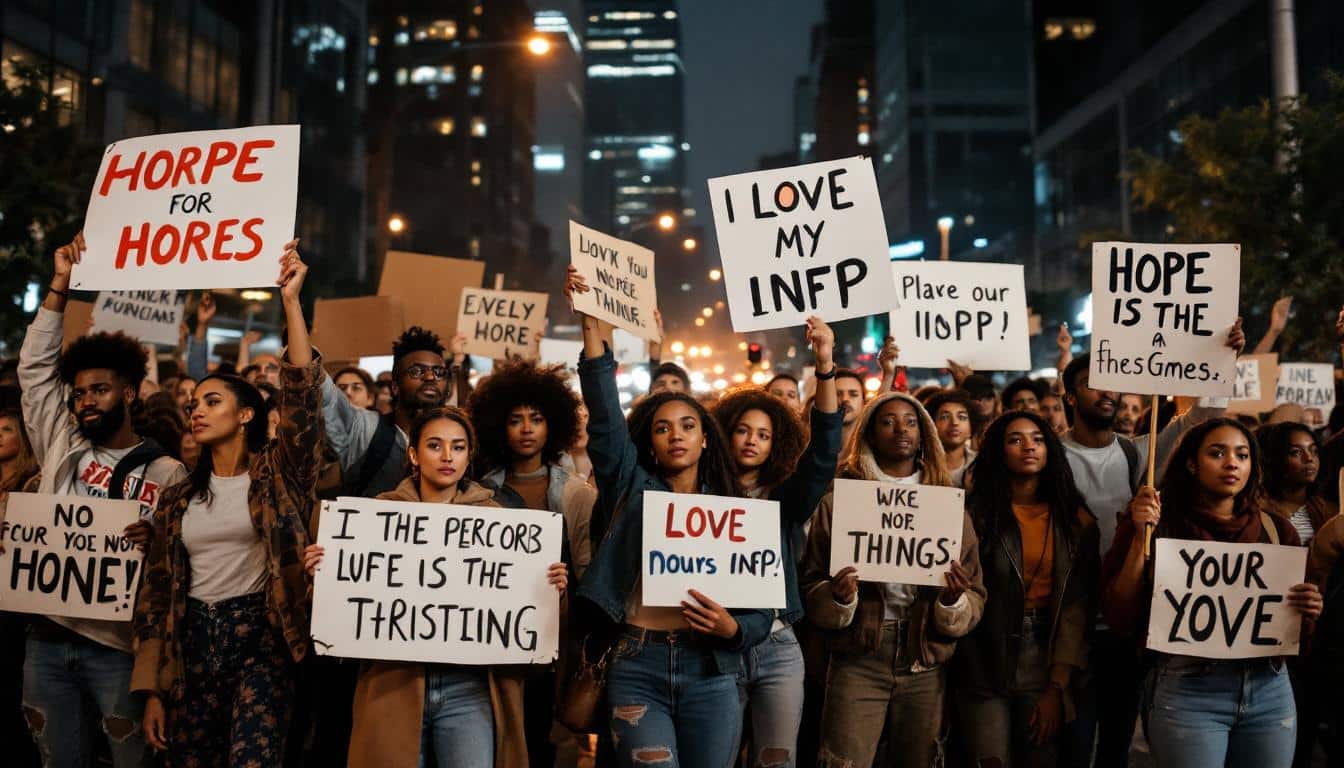Do you often feel misunderstood?Your softness hides an unsuspected strength.Your passion may remain invisible to the eyes of others.
In a world where expectations are heavy, you often challenge norms quietly. Your discreet presence brings a depth that is lacking in those around you. Many interpret your calmness as a weakness, without realizing the power of your inner conviction. You are here to assess, deconstruct, and rewrite the rules if necessary. Your kindness and sensitivity are the facades of your determination to defend what you truly believe in. You observe the world with a sharp intuition, ready to act when something goes against your values. It is this duality that makes you unique and admirable.

INFPs are passionate dreamers, driven by a deep desire to change the world. Their introspective nature allows them to question established norms and shake up the system when it does not reflect their intrinsic values.
Endowed with exceptional empathy, INFPs intensely feel the injustices and sufferings of the forgotten. This sensitivity drives them to take action, not out of a desire for recognition, but out of a moral necessity to defend those who are often ignored or marginalized.
By challenging conventional structures, INFPs pave the way for significant and lasting changes. Their ability to see beyond appearances and identify the true needs of society makes them essential agents of transformation.
Ultimately, INFPs embody a quiet strength that inspires and mobilizes around just causes. Their unwavering commitment to a more fair and humane world ensures that the voices of the vulnerable are never silenced.

Individuals of type INFP play a crucial role in social transformation. Endowed with deep empathy and remarkable creativity, they are often the drivers of subtle yet powerful changes. Their ability to perceive injustices and mobilize to correct them distinguishes them in a constantly evolving world. This article explores how INFPs use their unique traits to question the status quo and provide invaluable help to the most vulnerable.
The Fundamental Traits of INFPs
According to the Myers-Briggs model, INFPs are introverted, intuitive, feeling, and perceptive individuals. Their emotional sensitivity and idealization of the world drive them to seek a harmonious environment. These traits allow them to connect deeply with others and feel their pain. This empathy makes them particularly suited to identify and support those who are marginalized or misunderstood. To learn more about the specific characteristics of INFPs, check out this article.
Shaking Up Established Norms
INFPs do not just go with the flow; they seek to question norms and propose fairer alternatives. Their creativity and vision enable them to see beyond existing structures and imagine more equitable systems. By refusing to conform to rules they deem unjust, they inspire others to think and act differently. This ability to think critically and challenge the status quo is essential for instilling lasting changes in society.
Empathy and Support for the Forgotten
The profound empathy of INFPs drives them to reach out to those in distress. They are often drawn to humanitarian and social causes, seeking to provide tangible support to the most vulnerable. Whether through volunteering, writing, or activism, INFPs use their skills to give a voice to those who are often ignored. Their ability to understand and share others’ emotions creates an environment of trust and support, essential for helping the forgotten feel valued and heard.
Inspiring Examples of INFPs
Historical figures like Mary Shelley and Nellie Bly perfectly embody the INFP spirit. Mary Shelley, with her work Frankenstein, humanized what was perceived as monstrous, prompting reflection on human nature and society. Nellie Bly, through her daring investigation in a mental asylum, exposed abuses and sparked significant reforms. These examples demonstrate how INFPs use their creativity and determination to provoke meaningful changes, despite the obstacles encountered.
INFPs’ Unique Approach to Social Change
INFPs approach social change with a holistic and empathetic approach. Rather than seeking superficial solutions, they strive to understand the root causes of problems. Their ability to integrate different perspectives allows them to develop inclusive and sustainable strategies. By emphasizing authenticity and integrity, INFPs inspire others to join them in their quest for justice and equity.
The Challenges Faced by INFPs
Despite their remarkable qualities, INFPs face unique challenges. Their intense sensitivity can render them vulnerable to emotional overload and burnout. Additionally, their tendency to avoid conflict can sometimes limit their ability to effectively advocate for their causes. It is crucial for INFPs to find a balance between their commitment and personal well-being to continue having a positive impact without exhausting themselves. Resources like this article can help them better manage these challenges.
Maximizing the Impact of INFPs
To maximize their impact, INFPs must leverage their strengths while working on their weaknesses. Developing skills in assertive communication and stress management can help them better advocate for their ideas and sustain their commitment. By collaborating with other personality types, they can create strong alliances and effective support networks. Understanding the dynamics of different Myers-Briggs types can also provide them with tools to navigate various social and professional environments.
The Influence of INFPs in Organizations
INFPs bring a valuable perspective to organizations through their ability to innovate and humanize processes. Their attachment to values and ethics drives them to create more inclusive and respectful work environments. As editors-in-chief or creative leaders, they inspire teams to adopt more sustainable and human-centered practices. To discover how personality types can optimize productivity, check out this article.
The Role of INFPs in the Future of Society
As social and environmental challenges become more complex, the role of INFPs is increasingly crucial. Their vision and ability to dream of a better world position them as key players in movements for change. By promoting a more compassionate and creative approach, INFPs can help forge a more just and balanced society. They are the catalysts who, through their commitment and inspiration, can lead to profound and lasting transformation.
INFPs are essential agents of change, thanks to their empathy, creativity, and determination to improve the world. By shaking up existing systems and supporting the forgotten, they provide an invaluable contribution to society. To deepen your knowledge of INFPs and how to maximize their potential, explore this article. Their positive influence and inspiring vision are valuable assets in building a fairer and more harmonious future.

“`html
FAQ
Question: What is an INFP, and what are its main characteristics?
Answer: An INFP is an introverted, intuitive, feeling, and perceptive person. INFPs are known for their sensitivity, creativity, and deep commitment to their personal values. They have a unique ability to understand and empathize with others, which often drives them to protect the forgotten.
Question: How do INFPs shake up the established system?
Answer: INFPs tend to question norms and social expectations. They do not simply follow the rules; they evaluate, tear them apart, and rewrite them if necessary. Their approach is often inspiring and focused on searching for meaning and justice.
Question: Why are INFPs considered saviors of the forgotten?
Answer: INFPs possess a profound empathy and an innate desire to help those who are misunderstood or marginalized. They feel a particular connection with vulnerable people and are willing to offer their presence and compassion without expecting anything in return.
Question: What challenges do INFPs face in a systemic environment?
Answer: INFPs may feel isolated and misunderstood in systems that value conformity and efficiency at the expense of human values. Their sensitivity also makes them vulnerable to burnout when they invest too much energy in causes they are passionate about.
Question: How can INFPs use their strengths to bring about positive change?
Answer: INFPs can use their creativity and intuition to create artworks, write inspiring articles, or develop programs that humanize and protect marginalized individuals. Their determination and passion make them capable of initiating lasting and meaningful changes.
Question: What advice can help INFPs manage their own well-being while helping others?
Answer: INFPs should learn to set boundaries and take care of themselves first. This includes resting, taking time for themselves, and seeking support from friends or professionals when they feel overwhelmed. By taking care of themselves, they can continue to help others sustainably.
Question: What is the importance of radical compassion among INFPs?
Answer: Radical compassion allows INFPs to see and value the humanity behind each individual, even those whom society rejects. This ability drives them to protect and accept others without judgment, constituting a form of rebellion against indifferent social norms.
Question: How do INFPs influence those around them?
Answer: INFPs influence others through their authenticity, empathy, and ability to inspire. Their reassuring presence and commitment to human values often motivate those around them to act with more compassion and meaning.












